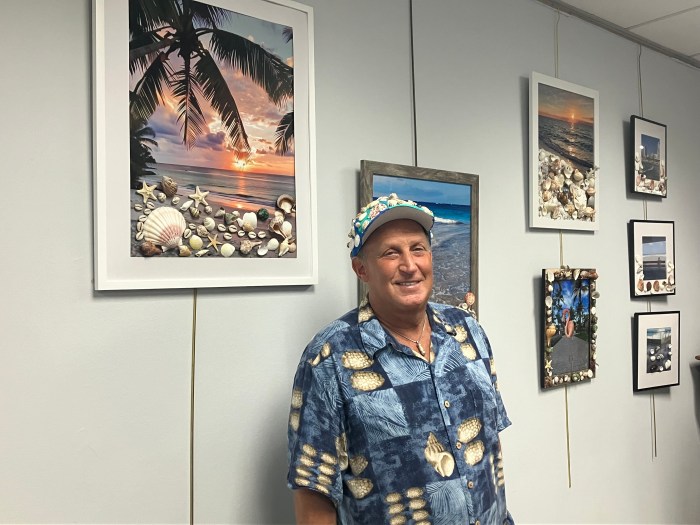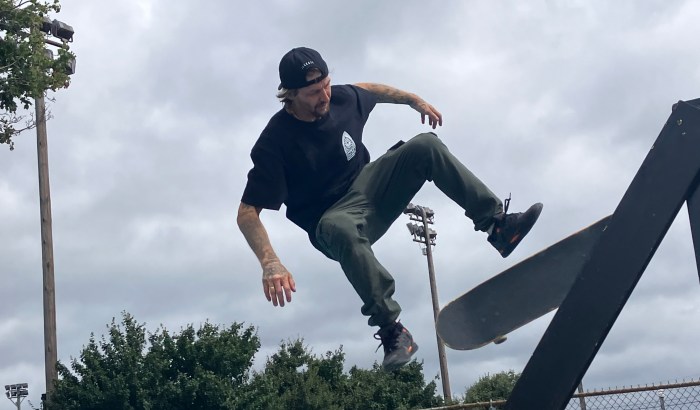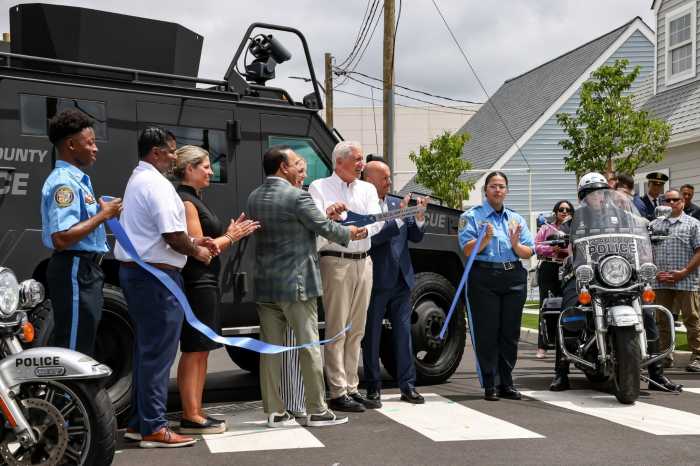
(Photo by Dave Gil de Rubio)
Puerto Rico may be 1,600 miles away from Garden City, but for a few hours, author Nelson Denis spoke about the economic fiasco that is going on and dominating the news when he made a recent speaking appearance at the Ethical Humanist Society of Long Island.  Denis’s recently released book War Against All Puerto Ricans traces the exploitative relationship the island and its people has had with the United States over the past century-plus. He had many attendees shaking their heads while explained how past events and policies continue to reverberate right up through the present-day economic crises plaguing this American commonwealth.
Denis’s recently released book War Against All Puerto Ricans traces the exploitative relationship the island and its people has had with the United States over the past century-plus. He had many attendees shaking their heads while explained how past events and policies continue to reverberate right up through the present-day economic crises plaguing this American commonwealth.
“This book is a history book but what I didn’t realize is that I basically documented a lot of the underpinnings of the relationship that exists between the United States and Puerto Rico. I actually wound up giving some very real context to what is happening on the island today,” he pointed out.
Among the numerous incidents that occurred on the island over the years that most Americans are blissfully unaware of that happened over the past few decades are the United States country bombing its own citizens during peacetime, maintaining more than 100,000 dossiers (called carpetas) on them that led to neighbors spying on one another and subsequently imprisoning and torturing dissenters. The source material for Denis’ book resulted from a request from Congressman Jose Serrano, who was on the House and Ways Committee, to then-FBI Director Louis Freeh to declassify 1.8 million pages of secret FBI files back in the year 2000.

the sugarcane, land and railroad were all owned by U.S. banks
While War Against All Puerto Ricans roughly ends around the 1950s, Denis reveals a number of historical players that would forever alter the arc of Puerto Rico’s entwined trajectory with the United States. People like Charles Herbert Allen the first civilian governor of Puerto Rico who during his 17 months in office, did ecological studies and placed 600 expatriates in strategic government positions to help turn the island’s diversified agriculture into a one-crop cash cow sugar economy. After drawing up a business plan, resigning from his position and heading to Wall Street and becoming the vice president of Morgan Guarantee Trust, he was able to tap into those 600-plus ex-pats to get numerous concessions including easements, tax abatement deals, water rights and auction sales, eventually spearheading the creation of four sugar refining companies that owned more than half the farmland in Puerto Rico. Within a decade, Allen was chairman of the board of the American Sugar Refining Company, which became the largest sugar refining company in the United States, owned more than 90 percent of the island’s refining capacity and is today known as Domino Sugar. Denis called him, “…a guy who economically turned the entire island of Puerto Rico into a crime scene by going down, casing the joint and turning out a business plan.”

There is Nationalist Party hero Pedro Albizu Campos, who led the first island-wide agricultural strike that ground the economy to a half for four months, successfully wound up doubling the sugar workers’ wages and put him on the radar of both Wall Street land barons and the FBI’s J. Edgar Hoover.

Luis Muňoz Marín, Albizu Campos’ ideological nemesis, was eventually the first democratically elected governor of Puerto Rico, who wound up being a stooge for the FBI and eventually imprisoning Campos for 25 of the last 29 years of his life. Denis also spoke of E. Frances Riggs, Puerto Rico’s answer to rabid civil rights segregationist Bull Connor. Riggs was not only the head of the Puerto Rican police force that was militarized upon his arrival to the island in 1933, but gave the order to shoot down four Nationalists during a protest at the University of Puerto Rico that became known as the Rio Piedras Massacre. Riggs followed that up with a press conference where he declared there would be “a war to the death against all Puerto Ricans” if Albizu Campos continued agitating sugar cane workers and students. Riggs’ father also happened to own the Riggs National Bank, which was known for financing fake revolutions throughout South and Central America that were actually rightwing takeovers.

Denis also brought up Public Law 53, La Ley de la Mordaza, which was passed in 1948 and made it a felony to own or display a Puerto Rican flag (even in one’s home); to speak in favor of Puerto Rican independence; to print, publish, sell or exhibit any material that might undermine the insular government ; and to organize any society, group or assembly of people with a similar intent. The penalty was a 10 to 20-year stretch in jail and before it was overturned in 1957 as being unconstitutional, Muňoz Marín has used it to arrest more than 3,000 people.

And while many of the chapters Denis’s book find much blood being spilled during these struggles, he points out that just as much damage has been done by way of destructive legislation and laws.
“That same war [against Puerto Ricans] can be conducted with a briefcase with shareholder derivatives and credit default swaps and [hedge fund billionaire] John Paulson going down,” Denis said.
With people like civil rights activist/author Bernice Sims and Hempstead Hispanic Civic Association Executive Director George Siberon in attendance, Denis made the case that the negative perceptions of Puerto Rico and its people are shaped by a lack of historical knowledge that isn’t broadly known thanks to geographic isolation and which facts do and don’t get disseminated.

The biggest modern-day example is while Puerto Rico owes $73 billion in debt, a 1920 statute called the Jones Act prohibits the island from importing its own products. Instead, foreign companies wind up detouring to Jacksonville, FL, unloading their cargo and putting it on an American-raised vessel. The 50,000 maritime jobs resulting from this should be in Puerto Rico and go a long ways toward addressing unemployment on an island where the annual per capita income is $16,000, half that of Mississippi, the poorest state in the Union.

Denis later led a round table discussion of his book and Puerto Rico’s current situation but not before wrapping up on a positive note.
“I’m proud to say that this war against all Puerto Ricans is continuing to this day but my eyes are open and it’s opening a whole bunch of others,” he said. “It’s creating a whole lot of controversy, but at least we have a Magna Carta so at least we know where we stand. There is a battle, but at least the lines have been drawn and I’m proud to be on the forefront.”
For more information about Nelson Denis or War Against All Puerto Ricans, visit https://nelsondenis.wordpress.com/home/


































